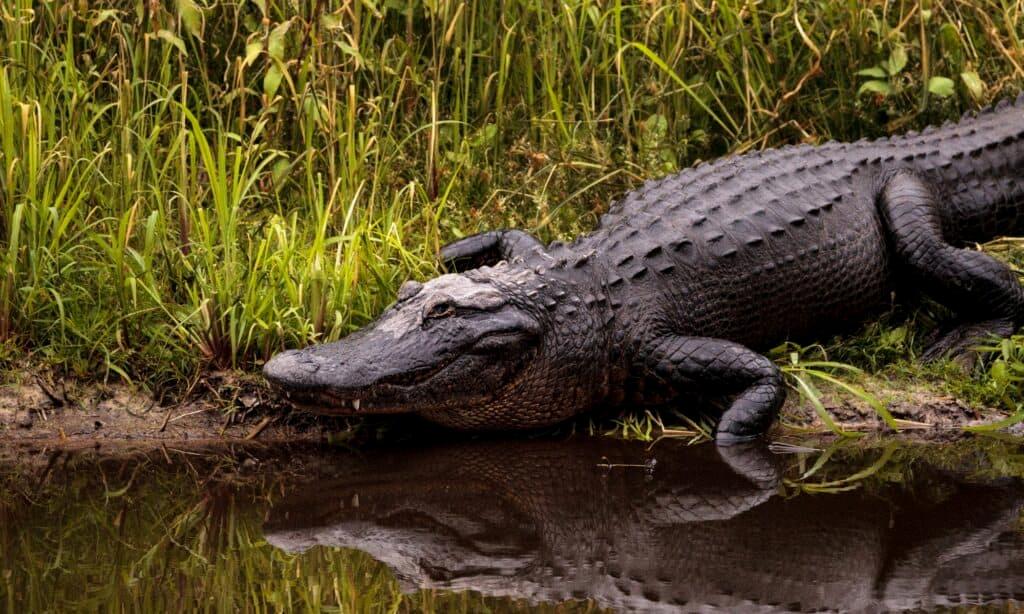Lake Jesup, located in Seminole County, Florida, is known for being home to some of the most unique wildlife in the state. It is particularly notable for having a high population of alligators, with an estimated 13,000 living in its waters.
The reason for this high gator population is due to the historical development of Central Florida. As developers built up the area, they had to relocate many alligators. Wildlife officers then decided to deposit these gators in Lake Jesup, leading to the current high population.
Despite this unusual origin story, the high number of alligators in Lake Jesup has created a unique ecosystem that attracts many visitors. In addition to alligators, the lake is home to a variety of bird species, making it a popular destination for birdwatchers.
However, it’s important to note that alligators are wild animals and can be dangerous if not approached with caution. Visitors to Lake Jesup should never feed or attempt to touch the alligators. Instead, it’s best to observe them from a safe distance.
Lake Jesup’s high alligator population is just one of the many unique features that make it a must-see destination for nature lovers in Florida. Whether you’re a birdwatcher or simply interested in observing alligators in their natural habitat, Lake Jesup is an excellent place to visit.
Are There Alligators In Lake Jesup?
There are alligators in Lake Jesup. In fact, Lake Jesup is known to have one of the largest populations of alligators in Florida. It is estimated that there are around 10,000 alligators in the lake. These alligators are an important part of the lake’s ecosystem and play a key role in maintaining its balance. It is important to be cautious when visiting the lake and to follow all safety guidelines to avoid any potential encounters with these powerful animals.

Why Does Lake Jesup Have So Many Alligators?
Lake Jesup has an unusually high number of alligators because it was used as a dumping ground for these reptiles during the development of central Florida. Wildlife officers had to relocate many alligators to make room for the growing human population, and Lake Jesup was chosen as a suitable location. The lake has become a habitat for an estimated 13,000 alligators, making it one of the densest populations of alligators in the world. This is due to the fact that Lake Jesup provies an ideal environment for alligators to thrive, with ample food sources and suitable nesting sites. The high alligator population in Lake Jesup is a testament to the resilience of these creatures and their ability to adapt to changing environments.
What Is The Most Alligator Infested Lake In Florida?
According to the Florida Fish and Wildlife, the lake with the highest number of alligators in Florida is Lake George, which is located in the northeast region of the state, near the St. Johns River. It is estimated that there are over 2,300 gators in this lake. The second lake with the most alligators is Lake Kissimmee, which is located near Orlando, with a count of almost 2,000. These statistics suggest that Lake George and Lake Kissimmee are among the most alligator-infested lakes in Florida.
How Many Alligators Are There In Lake Jesup Florida?
According to the Florida Fish and Wildlife Conservation Commission, the estimated number of alligators in Lake Jesup is 13,000. It is important to note that this is just an estimation and not an exact count. However, the commission reports that there are approximately 1.3 million alligators statewide in Florida.
Conclusion
Lake Jesup is home to an astonishing number of alligators, with an estimated population of 13,000. This is due to the fact that wildlife officers relocated many alligators to the lake during the development of central Florida. Despite the high number of alligators, Lake Jesup remains a popular destination for wildlife enthusiasts, as it boasts a diverse range of bird species and other unique wildlife. Visitors to the lake should exercise caution and follow all safety guidelines to ensure a safe and enjoyable experience. Lake Jesup serves as a reminder of the incredible biodiversity present in Florida and the importance of preserving and protecting these natural habitats for future generations.
